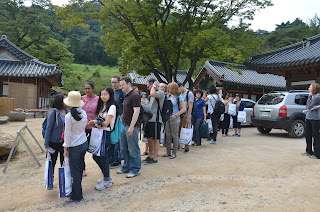
The final event of my templestay experience was to have tea time with the monk. We drank lotus flower tea and had a large-group Q&A time with him. I was surprised to learn that Buddhism has a lot more variation than I was originally aware of. If I understood him correctly, it seems like Northern Buddhism is more strict, to the rules, and mystical. They strive for enlightenment, where they understand the true nature of the universe, and understand thins beyond logic. Southern Buddhism, the type that this particular monk practices, is more practical. Southern Buddhism follow only the original teachings of Buddha, and doesn't have extra rules added in. They practice mediation as a way to strengthen concentration and alleviate suffering, not as an attempt to have a mystical enlightenment experience. Apparently, some monks in Japan can even get married! I was totally unaware of this. There are female monks, too. But they practice at their own, separate temples. Having the genders living alongside each other would be too distracting.
Some of the Q&A Highlights
He explained about the idea of oneness. That everything is connected. That there are no separate entities and that it is extremely difficult to live in the present moment.
Everything is connected:
A table isn't just a table. It was a tree. Now it's a table. Later, it will be dust.
Your body is not your body:
When you eat food, the nutrients from your food becomes part of your body. When you breathe air, the air becomes part of your body. When your hair falls out, it is no longer part of your body. Thus, your body isn't its own entity, completely separate from the world around it.
It is difficult to live in the present moment:
When your mind wanders, you are no longer in the present moment. You are either thinking about the past or the future. Even if you are thinking about yourself, you are thinking about the past because you are only what you've done so far.
I've heard ideas like these before, but I've never been in a position where I could directly question someone who fully views the world through these philosophies. The question I asked, related to these concepts, was about God. I was a bit perplexed because I had always thought of Buddhism as a religion. I was beginning to get the feeling that God played a very minor role in the Buddhism this monk practiced, though. It seemed more like a lifestyle than a devotion, or inquiry in to the realms of God. Also, if we are all one... if I am, in essence, also you... if there is no difference between us... then, are we all part of God? Or is there no God? I figured he would answer that God is not a separate entity. That we are all part of a universal force that could be referred to as God.
His actual answer was a bit different, though. His answer went something like this: Say you were struck with an arrow in the ribs. Your friend calls for a doctor, and a doctor comes. If the doctor just sits there asking you questions about your family history, how it happened, etc., nothing will get done. You will just waste time and eventually die. Instead, the doctor should just focus on relieving your suffering and pull out the arrow. With this being said, the monk concluded that questions about God are not important in his Buddhist practice. He said it is distracting to think about, and doesn't solve any real problems - it doesn't relieve any suffering.
Definitely not the answer I was expecting. Especially since I had thought of Buddhism as a religion. But now I think, at least for this monk's version, Buddhism is more of a moral and mental practice. A way of thinking and living. Not an exploration, or journey, towards God.
After our tea and question time was wrapped up, we had a final meal - another delicious vegetarian concoction, and we were off on our way! I was using a different bus to get home than the group tour, so I waited until they left. Then, to my surprise, the temple guide and monk offered me a ride to my bus stop, since they were heading that way anyway. During our short trip together, I discovered that the monk has been in Korea for nine years. And that he likes trance music. For some reason, this surprised me. I guess in my head, I had mistakenly associated monks with the Amish. being in a car and discussing techno and trance music seemed out of place. Just one more detail that helped open my mind up to how diverse and dynamic Buddhism and monks actually are. They're not necessarily the somber, quiet, and serious caricatures I have encountered in popular media's portrayal of Eastern religions.





No comments:
Post a Comment